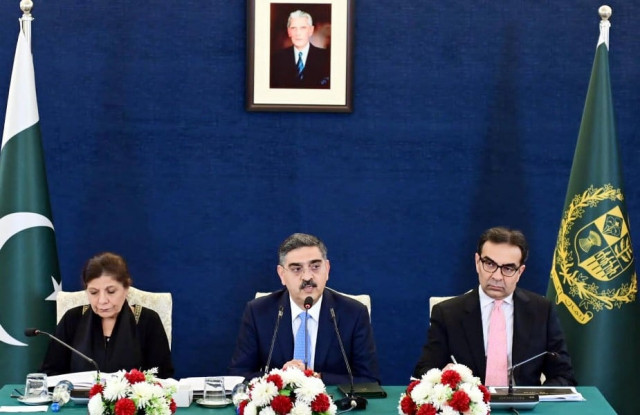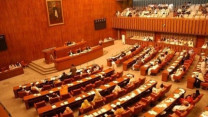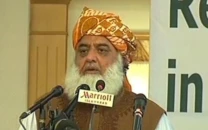PM Kakar’s stern message: pay the bills unfailingly
Kakar says govt will fulfil agreements with multi-national financial institutions

Caretaker Prime Minister Anwaarul Haq Kakar urged the nation on Thursday to pay their electricity bills, as he waited for a response from the International Monetary Fund (IMF) to Pakistan’s request for permission to spread the inflated bills over a six-month period.
In his first media interaction after assuming responsibilities over two weeks ago, the prime minister promised to offer a solution within a day but remained hesitant to share the details until those proposals were vetted by the IMF.
He also said that the Special Investment Facilitation Council (SIFC) – the civil-military body – was the platform to turn around the country’s economy, claiming that Pakistan would receive $60-70 billion investment in the next three to five years through this platform.
“We have communicated, they also have communicated”, Kakar said, when he was repeatedly asked to share the specifics of the proposals made to the IMF.
The prime minister met with leading journalists amid nationwide protests over back-breaking bills. His government sought the IMF’s permission to spread the electricity bills over a six-month period but has not yet received a response.
Caretaker Prime Minister Anwaar-ul-Haq Kakar talking to Anchors and Journalists in a meeting held at the Prime Minister's House. pic.twitter.com/Tokga1Jp7E
— Government of Pakistan (@GovtofPakistan) August 31, 2023
“People should pay their bills, as we are also going to launch a grand policy to recover bills from those who did not pay in the past”, said Kakar, when asked whether he would like to announce an extension until a decision is made.
Kakar said the government would fulfil its agreements with the multi-national financial institutions “at any cost” and would not allow “deviating” from them.
He assured that the caretaker set-up was holding negotiations with relevant multilateral institutions to come up with relief measures. “We are discussing several options and the reflections of these options will soon be announced,” he added.
Read more: Protests against rising power costs, inflation continue across nation
The prime minister refuted that the protests against the inflated bills was a matter of “law and order” but agreed that it was an issue, which would be resolved soon. So far, the government has failed to come up with any solution to calm the angry protesters.
Kakar blamed the political parties for enticing the people, saying that those politicians were responsible for the current situation. “From power generation, transmission to distribution, the whole electricity system is flawed and the employees of the power distribution companies are involved in the power theft,” he added.
“The interim set-up does not have any ulterior motive, plan or larger-than-life grand ambitions for which we are speaking here,” Kakar emphasised.
He admitted that the country was passing through the serious economic and security challenges but he gave a ray of hope in the shape of the SIFC. “We are hoping to receive $60 to 70 billion investment in the next three to five years under the SIFC banner.”
The prime minister stated that three to four joint venture agreements with foreign nations would be signed soon. However, he did not share any details of these agreements. He said that only the Reko Diq gold mines have $700 billion worth reserves.
In the third SIFC apex committee meeting, it had been decided that the Reko Diq and the Barrack Gold would equally dilute their shareholdings in favour of Saudi Arabia. A cabinet member said on Thursday that the quantum of Saudi investment in the Reko Diq could not be determined until a bankable feasibility study of the project was ready.
The prime minister said that the SIFC had approved the rules for mineral and mining sector to attract foreign investment.
While speaking about the dilapidated situation of the power sector, Kakar said that in the 1990s, load-shedding came forth as a challenging problem and governments entered into contracts with Independent Power Producers (IPPs) to increase power production.
“But we did not realise the repercussions of those contracts which included paying a surcharge,” he said, pointing out that there were problems in transmission systems and the bill recovery process.
The prime minister noted that while power bills were being burnt in one part of a city, electricity of around 200 to 400 megawatts (MW) was being pilfered with the connivance of the power distribution companies.
“When our population was growing, we did not realise that our power structure remained dependent on fossil fuels and imported fuel. Whatever we were doing was on the foreign exchange reserves and that is impacting our other governance aspects,” he said.
Prime Minister Kakar added that the government was closely looking at the inflated electricity bills and had done its own calculations. “We have held the most amount of meetings with respect to this in which we have tried to understand the power sector and talk to them … we have confronted them and asked for solution-based plans,” he stated.
The prime minister also stated that an investigation was under way on reports of free units being used by some sections, asserting that things being said on the social media couldn’t be considered “gospel truth”.
“If someone tells me here that electricity units of judges, generals, and Wapda [Water and Power Development Authority] employees are free, should I accept that? We have to officially inquire about the factual position. It is mixed,” he said.
Read more: Our hands are tied by IMF on ‘subsidies’
“I officially asked the military to tell us how many free units they get. The answer I got, which again has been verified, is that they do not consume a single unit free. Pakistan Army, Air Force and Navy contribute and pay bills against each and every unit that they consume. They pay from their own budget, which is their allocated budgetary position,” Kakar said.
Even in the judiciary, the prime minister said, the consumption of free units was not the same as what was being portrayed on the social media. Continuing, the prime minister added, only the Wapda employees were entitled to free units.
He said that the government would not withdraw the free electricity facility to power distribution company employees, serving from grade 1 to 16. But there is a proposal to either monetise the free electricity of the officers or cut the quantum of entitlement by half, he added.
“We are mulling over policy options and will come up with a policy within 48 hours,” said Kakar.
Talking about Pakistan’s security challenges, the prime minister said that the country recently witnessed a resurgence in Khyber-Pakhtunkhwa (K-P) and Balochistan. But he blamed the irresponsible withdrawal of the US from Afghanistan for the recent wave of terrorism in Pakistan.
“We believe and trust that no terrorist outfit has the capacity to take over the territory of Pakistan. They can’t even take over a union council. Yes, they have the ability to spread sabotage and the principle of lethality and survivability … for that, our response mechanism is also being revisited.”
He also stated that the Election Commission of Pakistan (ECP) was responsible for holding polls and hoped it would conduct free and fair elections.



















COMMENTS
Comments are moderated and generally will be posted if they are on-topic and not abusive.
For more information, please see our Comments FAQ